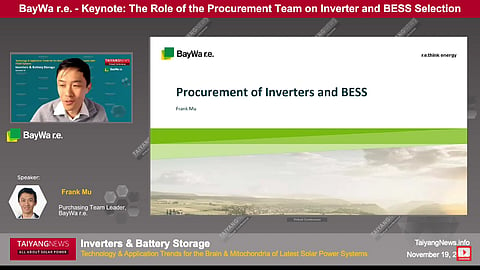

The PV inverter accounts for a small portion of the total cost of a utility-scale PV plant, but its role as the system's engine and critical component second only to the PV modules necessitates thoughtful and strategic procurement to ensure long-term reliability and stability. Furthermore, the increasing adoption of application-specific battery energy storage systems (BESS) alongside utility-scale PV installations underscores the need for intelligent and cost-effective procurement strategies.
Frank Mu, team leader of the procurement team at BayWa r.e., presented the company’s procurement strategies for inverters and BESS systems at the recent TaiyangNews Inverters & Battery Storage Virtual Conference 2024 (see Baywa r.e presentation here). BayWa r.e., the renewable energy arm of the 100-year-old German BayWa Group, entered the renewable energy space in 2009. Operating across three verticals – fixed-tilt, tracker-based, and floating utility-scale PV installations – the company leverages a centralized procurement team based in Germany.
Inverter Procurement
According to BayWa r.e., the importance of selecting resilient grid inverters equipped with comprehensive safety features and capable of converting each PV module’s maximum power point to a sinusoidal AC output is paramount in today’s market conditions. The availability and parameters of multiple MPPT (maximum power point tracking) channels in inverters also play a critical role in the planning of future projects. Unlike PV modules, where performance across different manufacturers can be easily compared, evaluating the performance of different inverters is far more complex. The company noted that while the performance differences between inverter models might seem marginal – sometimes just a few percent or even fractions of a percent – these discrepancies can significantly impact utility-scale projects.
Moreover, testing inverters in laboratories often cannot fully replicate real-life field conditions, leading to potential risks of undetected faults that may arise in operation. This underscores the importance of working with trustworthy inverter suppliers who can quickly investigate and resolve unexpected issues. BayWa r.e. maintains a limited number of approved inverter vendors and prioritizes building deep partnerships with suppliers and third-party testing institutes. By thoroughly understanding product features and associated risks, the company ensures reliable procurement decisions.
BESS Procurement
The procurement of BESS, a relatively new area for the purchasing team, has gained significant traction due to market growth, the influx of new suppliers, and falling battery cell prices driven by supply chain overcapacity. Mu explained that unlike PV modules, which primarily generate electricity for sale, BESS systems have a distinct business case where batteries must be charged and discharged to generate revenue. Thus, a clear understanding of revenue streams and project profitability is essential for developing effective BESS procurement strategies.
Technical considerations are equally important when procuring BESS. Key parameters such as state of charge, state of charge estimation, balancing, round-trip efficiency, and C rates must be carefully evaluated to ensure optimal system performance.
BayWa r.e. adopts 3 routes for BESS system integration:
Full System Integration – A single supplier designs and delivers the complete system, often offering turnkey EPC (engineering, procurement, and construction) and long-term O&M (operations and maintenance) services
Semi-Self Integration – A primary supplier provides the system while allowing flexibility to define certain DC and AC components
Full Self Integration – The company procures and integrates DC and AC components separately, offering the greatest flexibility but requiring advanced technical expertise and experience
Additionally, the company emphasized the importance of evaluating different battery technologies, including lithium-ion, sodium-ion, and redox flow batteries. By understanding the strengths, weaknesses, and suitability of these technologies for specific business cases, BayWa r.e. ensures it selects the optimal solution for its projects.
